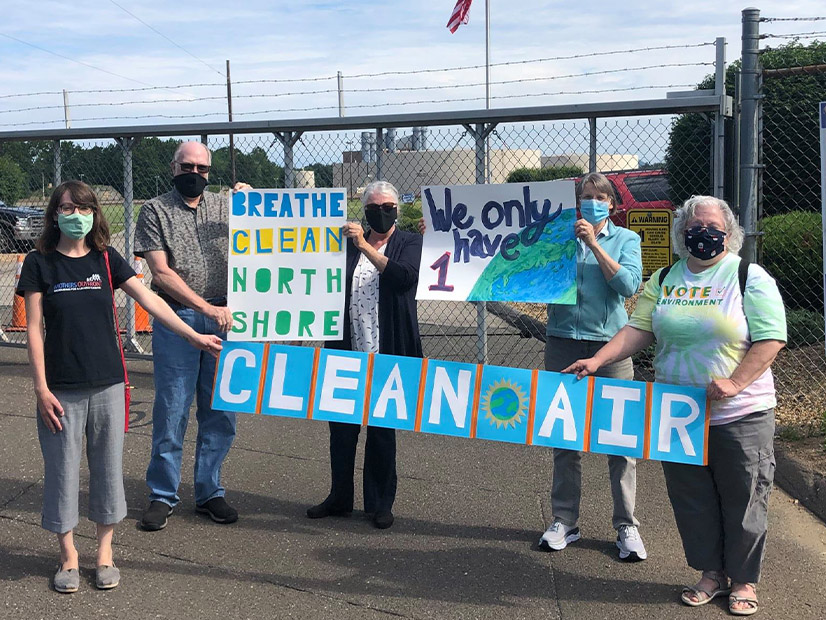Another climate organization in New England has joined NEPOOL membership as it looks to add a regional lens to its work.
The Massachusetts Climate Action Network (MCAN) on Oct. 1 became the newest member of the end user category of stakeholders in the ISO-NE stakeholder organization. It joined a small group of climate and environmental advocates who have been trying to make a dent in a process they say sometimes seems tilted against them.
MCAN’s focus is largely local; its model is to support municipal chapters that often focus on specific projects within their footprint.
But the group’s advocacy against the Peabody peaker, a contentious gas and diesel plant under construction north of Boston, has led it down a rabbit hole of regional debate that its leaders felt they could not ignore.
“We’re really focused on supporting residents and taking local action,” Logan Malik, the group’s interim executive director, said in an interview. “But in order to do that, sometimes you need changes to take place at the statewide or regional level.”
Starting with the debate around ISO-NE’s minimum offer price rule (MOPR), and more recently discussions around capacity accreditation, MCAN has been paying more attention to the regional dynamics that help shape the projects they’re focused on.
“We saw this as an opportunity to engage with the various stakeholders across the region who are working on these issues day in, day out,” Malik said.
He added that one of the organization’s goals of participating is to make the information coming out of ISO-NE and NEPOOL more accessible.
“I think there’s still definitely a challenge in translating these very complex discussions into things that people understand and people can engage in,” Malik said. “Residents care about this stuff. Residents care about these decisions. And it’s very hard for residents not working fulltime in an organization like MCAN to actually understand the material that’s coming out.”
Taking on ‘Entrenched’ Fossil Interests
MCAN won’t be without friends as it starts navigating its way through what can be a confusing and intimidating stakeholder process. There are a handful of other environmental groups, like the Acadia Center, Conservation Law Foundation and Natural Resources Defense Council, that have increasingly seen NEPOOL as an important venue for their advocacy and a necessary part of their work. Malik cited all of those groups and others as allies that have helped the organization get up to speed on the regional level.
The NEPOOL stakeholder process MCAN is joining hasn’t historically been an easy place for environmental groups to gain a foothold. It’s a big time commitment, with complex meetings that take place during the week for as long as multiple days at a time. Some groups, like NRDC, have elected to hire consultants to help stay on top of the process and present their ideas.
“It’s a question of resources. The technical committees meet regularly, and the meetings can be lengthy,” said Phelps Turner, a senior attorney for CLF.
There’s also an incumbency effect that gives many of the longer-standing members advantages.
“I think that the way that the system is set up, in the way that the voting structure and [NEPOOL] operation works … there is a certain bias towards incumbency and the existing system. Trying to move in a new direction isn’t always easy,” said Bruce Ho, a deputy director at NRDC who represents the organization within NEPOOL.
Ho’s experience with the MOPR debate and other changes that he argues are needed to enable the clean energy transition and decarbonization has featured lots of pushback, he said.
“I think there’s a lot of entrenched value, a lot of entrenched economic investments and interests in the current fossil system.”
There are just six environmental organizations out of more than 500 NEPOOL members, although they also often align on issues with renewable developers and suppliers, or state officials and consumer advocates.
“I think those voices can serve as an important counterbalance in the stakeholder process, to stakeholders from the fossil fuel industry, who have historically dominated the conversation and who have a vested interest in maintaining the status quo at all costs,” Turner said.
Whether they have a meaningful impact on ISO-NE’s decision-making in the region is an open question though.
“I think there’s always room for more participation, and more diverse participation,” said Turner. “Until then, it may be hard to influence the ultimate outcome of various decisions.”
The View from NEPOOL
Groups like MCAN are welcome, encouraged and appreciated in the stakeholder process, said David Cavanaugh, chair of the NEPOOL Participants Committee.
He said that the climate and environmental groups that have previously participated in meetings have represented their interests well.
“We welcome others who are similarly willing to invest the time to understand and work collaboratively in seeking ways to address creatively the many interests and concerns at the table, and to find enduring solutions to the challenges we are now facing, including prominently the need to reliably serve the region’s energy load while addressing climate change by reducing carbon emissions from the industry,” Cavanaugh said.
He acknowledged that joining NEPOOL can be a challenge for new members.
“There is unquestionably some ramp-up time to learn about the members and their various interests and concerns, and to understand the issues facing the region and alternative ways to address those issues,” Cavanaugh said.
But he laid out a series of ways that the organization aims to get them up to speed, from targeted orientation sessions and trainings, to elected sector officers tasked with helping new members in their sector.
“In my experience, new members will find that representatives of the NEPOOL participants and NEPOOL counsel who have been in the region for decades are generally very willing to educate and fill in knowledge gaps,” he said.



